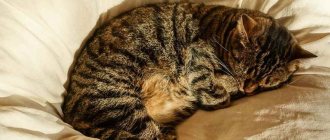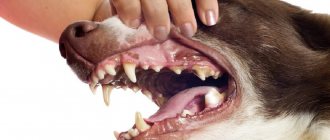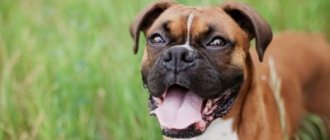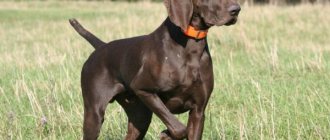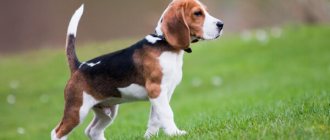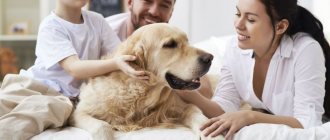When and how do dogs sleep?
How many hours do dogs sleep?
Dogs can sleep most of the day. They do not need to be on guard all the time in case any danger suddenly appears and they do not need to waste time searching for food. Also, most pets sleep soundly at night. This applies to pets that live in the apartment. Watchdogs sleep more lightly at night. You can often hear how one dog on the street begins to bark at night and everyone who could hear it starts barking after it.
Additional Information! Dogs sleep in completely different positions - on their stomachs, on their backs, curled up. Sometimes it’s not even clear how the dog went to sleep in such a strange position and how comfortable it is for him.
When it's hot, animals sleep on the floor or crawl into secluded places, such as under the bed. When it’s cold, they move to a couch or to the master’s bed, if they are allowed to do so.
Most dogs have a similar daily routine. Dogs doze off after a morning walk and meal, then they can wake up, play with a toy and lie down again. Then come from the street and go to bed.
Why does a Yorkie sleep a lot: is it right?
As a dog grows up, it tries to be active most of the time, but this does not mean that it is awake all the time. It is considered normal that when a dog immerses itself in dreams, it spends 16 to 18 hours in this state. This period of time includes all rest for the day. If it seems to you that your Yorkie sleeps all the time, then perhaps he prefers short periods of active action.
It happens that during the day a pet can fall asleep for ten minutes and wake up completely rested. As a rule, a terrier between the ages of one and three years is ready to sleep for a long period.
Many dogs adapt to their owner's schedule, and if your Yorkie doesn't sleep at night, it's most likely because of their schedule. In any case, it all depends on the silence and circumstances. In a quiet room, the dog will doze very deeply and a lot.
When a Yorkie sleeps a lot and does not become active when it wakes up, you should worry about its health. He may be sick, so go to the doctor immediately to get a diagnosis.
In general, when buying a Yorkshire Terrier, be prepared for the fact that he loves to sleep. During the day there may be several phases that will last from ten minutes to two hours and this is normal. After waking up, the dog will need about thirty minutes to fit into the new day, become active and friendly. Give her time to adapt.
So, we answered the general question of how much a Yorkie should sleep above, but the rest is all purely individual. Pets are as different as people, with their own personalities and routines. It is possible that it is normal for your dog to sleep eighteen hours a day, if he is generally behaving normally then there is no need to worry. The main thing is to take care of your faithful friend and monitor your health!
31.08.2018
Katie Berman, Bill Landesman
How much do dogs sleep per day?
Reasons affecting how long a dog sleeps:
- Stress. Severe stress and psycho-emotional stress can be associated with moving, the appearance of a new pet or person in the house, or a long absence of the owner.
- Disease. Some diseases affect the duration of sleep more or less. Insomnia or, conversely, drowsiness may develop.
- Weather. Many pets begin to lie down more and more often when the cold season arrives. For example, in autumn and winter, when daylight hours are short and it is dark outside most of the day. Also, in rainy weather, dogs like to lie down to rest. Another period when the weather affects the duration of falling asleep is the summer heat. It is difficult to move a lot, dogs tolerate heat less well, so to prevent the body from overheating further, dogs usually lie on the floor and move little.
- Estrus. During the period of heat, the behavior of the pet depends on the individual characteristics. Some people sleep as usual, other dogs may start sleeping differently, not in their usual position. There is no reason to panic in this case, unless the behavior in general becomes strange. Or if drowsiness is combined with lack of appetite, weakness and reluctance to play your favorite games.
- Boredom. When left alone for a long time, for example, when the owner is at work, the pet has nothing left to do but doze all day. It is better not to allow your pet to start sleeping more out of boredom. Although this is better than him destroying and gnawing everything in the house. But in any case, being alone for a long time without an owner has a negative impact on mental health.
Sleep duration
Many people have a certain stereotype - on average, an adult should sleep at least 15 hours a day. This is a general indicator and does not take into account factors that affect the amount of sleep a specific breed of animal can take.
Age. Puppies sleep the longest at up to three months. Sometimes it seems to the owners that during this period the babies sleep very soundly even during the day. At this age, a puppy can sleep up to 20 hours a day. This is a normal phenomenon, since the puppy learns to guard the territory, respond to extraneous sounds, and this process is quite exhausting for him. Older puppies, at the age of 6 months, will sleep a little less - up to 18 hours a day. During this period, whining and twitching of paws in sleep is considered normal. But if a pet walks with half-closed eyes during sleep, this is a symptom of a neuralgic disorder. Older dogs' sleep can be similar to that of small puppies and can reach 20 hours a day. But in some cases, dogs after 8 years of life remain the same, vigorous and dynamic, and their sleep duration is not disturbed. For all other age categories, the duration will depend on the activity of the animal throughout the day.
Loads. If your pet is under-exercised or receives little attention, it is natural that he will eat, sleep and gain weight.
General atmosphere. If the house is calm, there are no scandals, loud music or other irritating factors, the dog will doze much more often. This, of course, is not complete rest, but it is also extremely important for the animal. But when there are constantly quarrels in the house, there are a lot of strangers, naturally, there can be no talk of any daytime naps. Noise and strangers are stress factors that greatly affect the condition of animals, which is why they sleep restlessly at night.
Mode. All pets develop sleep and wake patterns over time. In most cases, pets adopt the habits of their owners, so if a person has developed an afternoon nap, he will follow this example. Representatives of companion dogs, such as Pomeranians, Pekingese, pugs, etc., perfectly adapt to the regime of their owners. Dogs of hunting breeds (Jack Russell Terrier, Beagle, Fox Terrier) do not tolerate violations of the regime.
Dimensions. Many people believe that representatives of large breeds, such as St. Bernard, Great Dane, and Newfoundland, sleep much longer than small ones. This is true, but the reason is not the size of the animal, but the temperament
Large breeds, confident in their abilities, pay less attention to external stimuli, so their sleep is sounder and longer.
Health status. A dog, like its owner, can be sleep-deprived and aggressive. Adults who do not have health problems get enough sleep in 14-16 hours. But if a pet between the ages of 3 and 7 years sleeps much more, this may be a sign of illness. Dogs with chronic pathologies, such as obesity, arthritis, heart failure, become exhausted much faster, and therefore sleep much more. A stressed animal will also sleep longer because it takes longer to recuperate. This problem can be easily solved by having a comfortable place to sleep at the right temperature.
Sleeping mode
Just like people, dogs of all breeds (Labradors, Yorkies, Jack Russell Terriers, Dachshunds and others) sleep different amounts of time depending on their age.
How long should a puppy sleep?
Newborn puppies, up to a month old, spend almost all their time dozing, taking breaks only to eat. The body is growing rapidly and for normal development, being awake is contraindicated for puppies.
How puppies sleep
How much should a puppy sleep at 2 months? The answer to this question depends on the breed, but on average, continuous sleep lasts 3-4 hours. Up to six months this time increases to 6 hours. At this age, more time is spent on walks, games, and exploring the world around us.
Important! Closer to six months, older puppies switch to the mode of adult dogs.
Adult dogs
Adult dogs sleep 14-16 hours a day. The duration may be longer if the day was busy, the pet walked or played a lot, and therefore was more tired than usual.
Elderly pets
At this age, the period of wakefulness decreases again. The pet already has less strength and gets tired faster. In addition, age-related diseases have an impact.
Dogs daily routine
Naturally, a dog’s daily routine directly depends on the person.
There are breeds that require consistency; they get used to eating, sleeping, and walking at the same time, and they experience any changes very acutely. This applies to hunting dogs, as well as animals with hyperactivity. They may stop sleeping normally if the owner had to leave, or even if the owner was late at work. But companion dogs have a very stable psyche and can always adapt to the owner’s needs. For them, the main thing, even with a delay, is to do what is necessary - take a walk, eat and relax.
When purchasing a dog, you should pay attention to this aspect. Will it be possible to provide the pet with the necessary regime, or give preference to a breed that can sleep when necessary? Why can a dog dream?
Why dogs love to sleep with their owner: opinions of experienced owners
The dog twitches in its sleep: should you worry?
Why can a dog dream?
Why dogs love to sleep with their owner: opinions of experienced owners
The dog twitches in its sleep: should you worry?
Do you know how long dogs sleep? We all know that the average time for healthy sleep for a person is 8 hours. Is there such an indicator of sleep duration for animals? Let's figure this out.
The amount of time a pet spends in the power of Morpheus depends on many factors. A dog is a social animal. It completely adapts to the daily routine of its owner. As a rule, an adult animal will sleep as long as its owner sleeps. Although some little tails (for example, like our “shin-bottomed” Dzhekushka) do everything in order to wake up everyone in the household in the morning. You can read how he does this in the article:.
Even very little time is devoted to bowel movements as the dam stimulates the newborn puppy to eliminate. A newborn Chihuahua will sleep anywhere from 20 to 23 hours a day. They usually just wake up to see the nurse and this happens about every 2 hours.
A Chihuahua puppy's long-term sleeping habits will begin to change noticeably around the 3-week mark. At this time, the puppy learns to walk, the eyes are fully open, and the ability to hear is functional. This is a time of great curiosity and exploration as the puppy may be traveling from the dam.
On average, an adult animal sleeps about 12-15 hours a day. But this indicator is individual for animals and depends on many factors.
Stages of sleep
Sleep in dogs is divided into several stages. How much dogs sleep depends on their sleep phase.
Nap
The animal is usually half asleep when it goes to bed during the day. In the evening, this is the first phase of sleep, which eventually turns into deep sleep. Napping is characterized by the fact that the pet is on the verge of falling asleep and being awake. Usually dogs are in this type of sleep when they are a little tired, but not so tired that they can go to bed fully. The dog hears everything that happens in the house and is ready to wake up at any moment.
Shallow sleep
When a little tired, the dog can lie down and fall into a shallow sleep. Quiet sounds will not wake him up - only loud ones. During this period, the animal’s body rests and recuperates. Pets usually go into this type of sleep after a walk or meal.
Deep
If no one interferes, then after the first two phases the third phase begins, which is characterized by deep, prolonged falling asleep. There are no dreams at this time, the body is relaxed and motionless.
Fast
The third phase after some time transitions into REM sleep. This is the period when dreams appear. The dog may open its eyes slightly, twitch its paws and bark. There is no need to wake up the dog, even if it whines or twitches its paws. This is a normal condition and is not dangerous for the pet.
Note! The deep and fast phases alternate each other, just like in humans. If the change does not occur, then the animal will not be able to fully rest and recuperate.
Dogs love to sleep on their backs with their paws up
Sleep phases
To ensure your pet gets quality rest, it is also useful to know about the sleep stages of dogs.
REM sleep
How many times does a mother rabbit feed her babies per day?
It has the shortest duration and in dogs accounts for approximately 20% of all sleep. It appears in the intervals between phases of slow-wave sleep, lasting a maximum of half an hour.
Research has not established 100% significance of this phase. But most scientists are inclined to believe that the meaning of this phase is the erasure of information. A dog’s body, like a human’s, does not need all the amount of information that is analyzed per day, especially negative information. Therefore, during REM sleep, the brain filters out what is not needed. This leaves more room for important information and various basic reflexes.
Important! REM sleep may be accompanied by twitching of the paws, eyes, rapid breathing and sometimes sounds (whining). This condition is normal due to the fact that it is during this phase that the dog dreams.
slow sleep
The remaining 80% of the time is occupied by him. In this phase, the body relaxes. Cell renewal occurs, as well as the assimilation of information that was not erased after the fast phase and is important for the brain.
Dogs sleep very soundly during slow-wave sleep.
All muscles are relaxed, so there will be no twitching as in the fast phase. The dog falls into deep sleep and may not respond to sound stimuli.
It was generally accepted that dreams did not occur during slow-wave sleep. But new research has proven that even in this phase the pet dreams. But they do not remain in the dog’s memory, and are not as vivid as during REM sleep.
Positions that dogs like to sleep in
In what positions do our four-legged friends lie? Sometimes it’s hard to imagine how the dog managed to lie down and fall asleep so soundly.
The most common provisions:
- On the back. This position indicates that the pet is completely relaxed and is in a comfortable environment. In this position, all the weakest points are open - the throat and stomach. It may also indicate that the pet is very tired and wants to go into deep sleep to regain strength. Dogs usually sleep like this at night.
- On the stomach. Lying on its stomach means that although the pet is sleeping, it hears everything and is ready to jump up on its paws at any moment. Usually this is how yard dogs that guard the house sleep. Some puppies that are already a little older also sleep this way. Usually the paws are spread out to the sides. This allows the puppy to wake up faster, get up and start playing.
- On the side. This is how dogs usually sleep when they are hot. Most often in this position they lie on the floor. Dogs feel comfortable and confident because they are safe. Although weak points are still covered, this position allows the pet to fall into deep sleep and get a good night's sleep.
- Kalachik. A dog can sleep in a ball in two cases. The first is if it is a stray dog, since it needs to be on alert all the time, and this way it can hide its weak points and rise up faster when danger comes. The second is if it is a domestic dog and it is cold. Usually, with the onset of cold weather, doggies curl up comfortably on the sofa and sleep sweetly.
Pet sleeps in a curl
Why shouldn't a dog sleep in its owner's bed?
There is a constant debate between fans and opponents of sleeping with a dog. Both sides make arguments that deserve attention. Oddly enough, it is the opponents who most often lose, since their protest is conditional and based on an imposed opinion. Note that dogs of some breeds really should not sleep in beds and on upholstered furniture, due to their tendency to territorial dominance over the owner.
Remember any film about wolves, and if you haven’t seen them, then a cartoon about Mowgli. Where did Akella sleep? That's right, on the rock, above everyone else, keeping an eye on the flock and constantly pricking up his ears. This is a vivid illustration of hierarchy, the one who sleeps higher is more important. When you allow your dog to sleep in your bed, you are showing that your dog is not inferior to you. THIS tactic is acceptable for fearful and neurotic dogs, but unacceptable for tough and aggressive breeds.
It is quite possible to avoid your pet’s obsessive attempts to sleep with you; to do this, you need to make sure that the dog is cozy, comfortable and safe. If you have several pets, clearly separate their sleeping areas. If possible, place sun loungers at different ends of the room. By the way, a dog must have a bed, even if you cannot buy a high-quality accessory, you can make it yourself.
Sleeping in the same bed definitely increases your chances of getting parasites. Fleas can live in mattresses and blankets. While on a walk, your dog may step in feces, sewage, or any other source of bacteria, and if you don't wash your pet's paws, all this "delight" will end up on your bed. By the way, salmonella, which is dangerous to humans, successfully survives in animal feces. All these arguments are broken by the statement that with high-quality dog care, there is no danger. Regular parasite prevention, daily examination before bed, washing paws and other measures reduce the risk of health hazards to a minimum.
Stories from our readers
We have a dog and two cats in the house - so there is always enough wool. I've almost come to terms with this. I had already used various “sticky rollers” before and, frankly speaking, did not get a positive result. But one remedy really helped me! Read the full article >>>
What sleeping dog poses say
Each dog chooses a sleeping position depending on its individual preferences, so even siblings can sleep completely differently.
Additional Information! The posture is influenced by many factors: age, room temperature, pet’s mood. When it's cold, dogs sleep curled up, and when it's hot, they can stretch out at full length on the floor.
Your mood also affects your posture. When a dog feels safe, it completely relaxes and takes strange poses. For example, he lies on his back with his paws outstretched. While sleeping in this position, all weak points are exposed, so the pet can only assume this position in the most comfortable environment. In addition, in this position all muscles are as relaxed as possible, which cannot be said about other poses. So the dog will lie down only if it is confident in its safety and is in the house or next to the owner.
During and after pregnancy, dogs, regardless of breed, be it a Chihuahua, Spitz, Pug or Shepherd, choose a position that allows them to quickly jump up and protect the offspring.
Do dogs dream?
There are many differences between dogs and humans, but it has long been known that the human and canine brains are similar at a structural level. Animals are characterized by deep sleep, which is accompanied by rapid eye movements and intermittent breathing. It is in the stage of deep (rapid) sleep that people dream, and it can be assumed that dogs also dream. To prove this, we can cite numerous examples of how dogs in their sleep begin to move their legs, imitating running, whine, and wag their tail. This fact is confirmed by scientists. Moreover, it turned out that representatives of small breeds dream more often than large animals, but large animals sleep last longer.
Scientists, based on studies aimed at studying the brain activity of dogs during sleep, have concluded that pets dream of typical daily events - eating a piece of meat, chasing a cat, playing with the owner. It turned out that puppies dream more often. It is assumed that this is due to the processing of a huge amount of newly acquired experience.
Why does a dog spin around before going to bed?
Dogs are funny creatures, many of whose actions touch their owners. But strange behavior often hides instincts that pets inherited from their ancestors. For example, when a dog starts to spin around before going to bed.
Many dogs begin to fidget in one place for a long time before lying down. This is due to the fact that the dogs’ ancestors trampled the grass for a long time to make the place safe. For example, a snake or some other dangerous animal may be hiding in the grass. It's also a way to make yourself a more comfortable place. Although dogs have been sleeping on soft beds in warmth and comfort for a long time, the habit of spinning around before bed is still preserved.
Important! Your pet will have the deepest sleep if it sleeps next to its owner. Also, falling asleep together has a positive effect on the person himself.
Why dogs love to sleep with their owner
Most four-legged friends love to sleep with their owners.
There are several main reasons for this behavior:
- Firstly, the need for warmth and comfort. This is especially true for small dogs. Small body size and accelerated metabolism require a lot of energy for thermoregulation. To such babies, room temperature may seem cool. As a rule, there are drafts on the floor and the air is much colder than at bed level. The master's bed is soft, comfortable, and the warmth of the human body warms in any weather.
- Secondly, the dog may not like the dog bed. The small size of pet houses and sofas can be embarrassing for the dog. If the dog likes to sleep stretched out to its full height, then it simply may not have enough space in the place adapted for it.
- Thirdly, pets often lack attention and affection from humans. Especially if the owner works a lot. Often, strong psychological bonds are formed with dogs. Dogs become loyal, become attached to people, and spend days alone and become very bored. To get the affection and intimacy they need, they take advantage of the moment at night while the owner is sleeping.
- Fourthly, education. While the puppy is small, it evokes affection and a desire to babysit it and take care of the baby. Frequent caresses, hugs and stroking form the animal's habit of close contact. Which, subsequently, manifests itself in the desire to sleep together.
- Fifthly, stress. Noise, sharp sounds, small children in the house lead to a stressful state in the dog. Close contact with the owner at the same time calms and creates a feeling of comfort.
- Sixth, protective instinct. From the height of the bed, you can better see the territory, the owner is nearby. It is easier for a dog to guard his home.
By leaning his back against you, the dog can control what is happening around him
Possible violations
Sleep disturbances or insomnia are rare in dogs. As a rule, pets sleep soundly at night and do not wake up without a good reason. But even they have problems sleeping. Insomnia can be caused by both psychological and physiological problems.
The dog may not sleep at night if it is stressed, worried, or in a tense emotional state. Also, problems with sleep are possible in dogs that have suffered from cruel treatment; the psyche of such pets is traumatized.
Sleep disorders in dogs
Physiological reasons cannot be ruled out. For example, itching from fleas or allergies, otitis media, arthritis, pinched nerves, and other diseases that cause pain. All this can cause sleep disturbances.
Healthy sleep is very important for all pets, including dogs. If sleep disturbance occurs or insomnia occurs, then this generally negatively affects the entire body, and immunity decreases. If the owner observes sleep disturbances in the pet, it is worth contacting a veterinary clinic for help.

